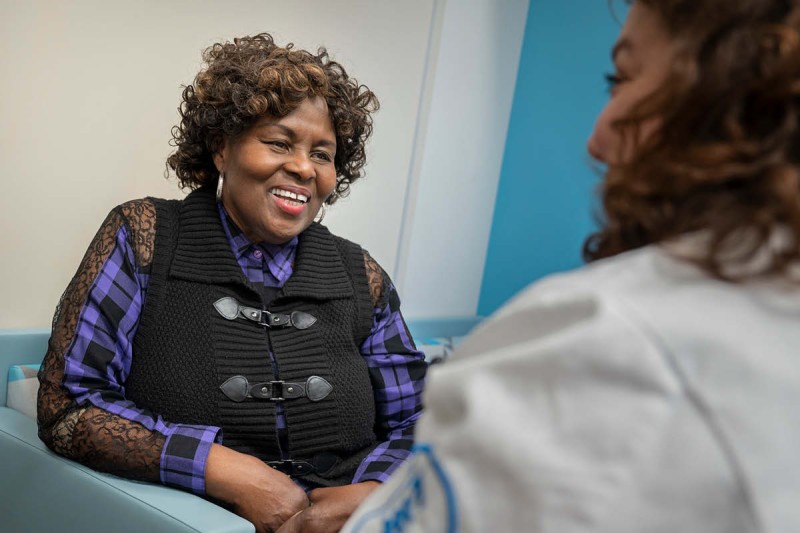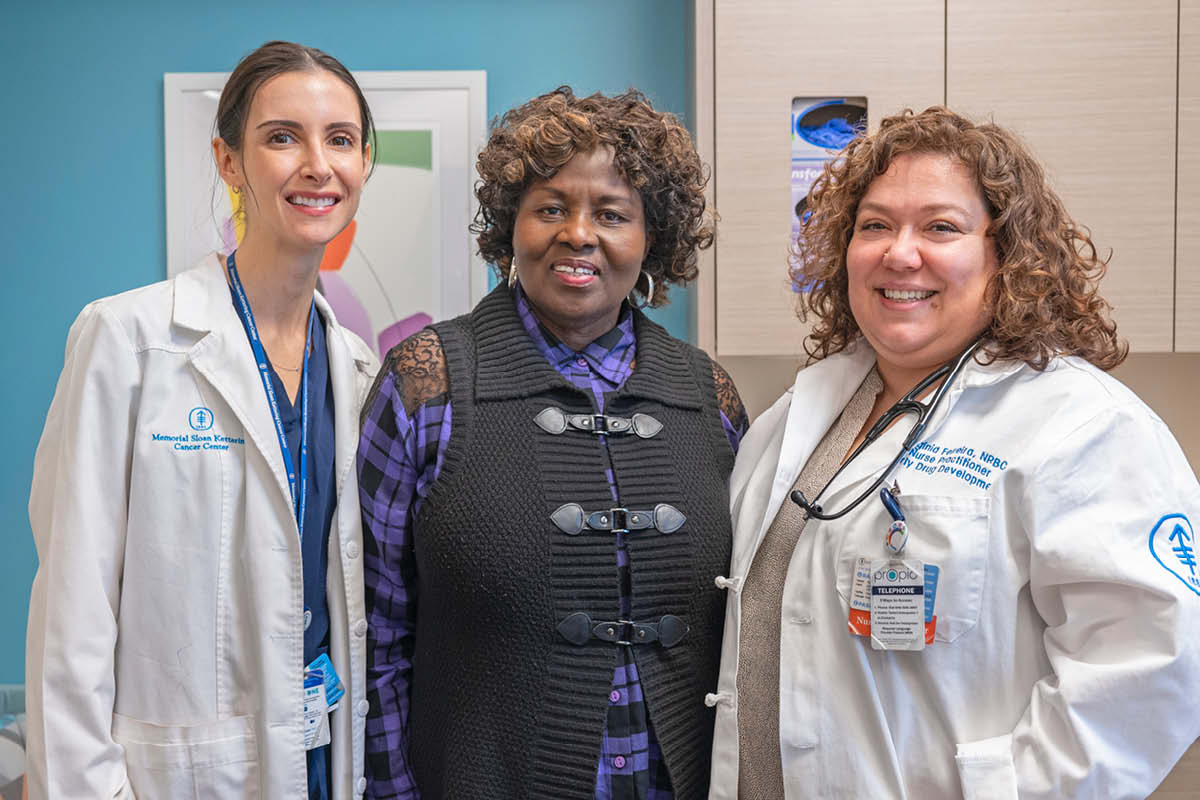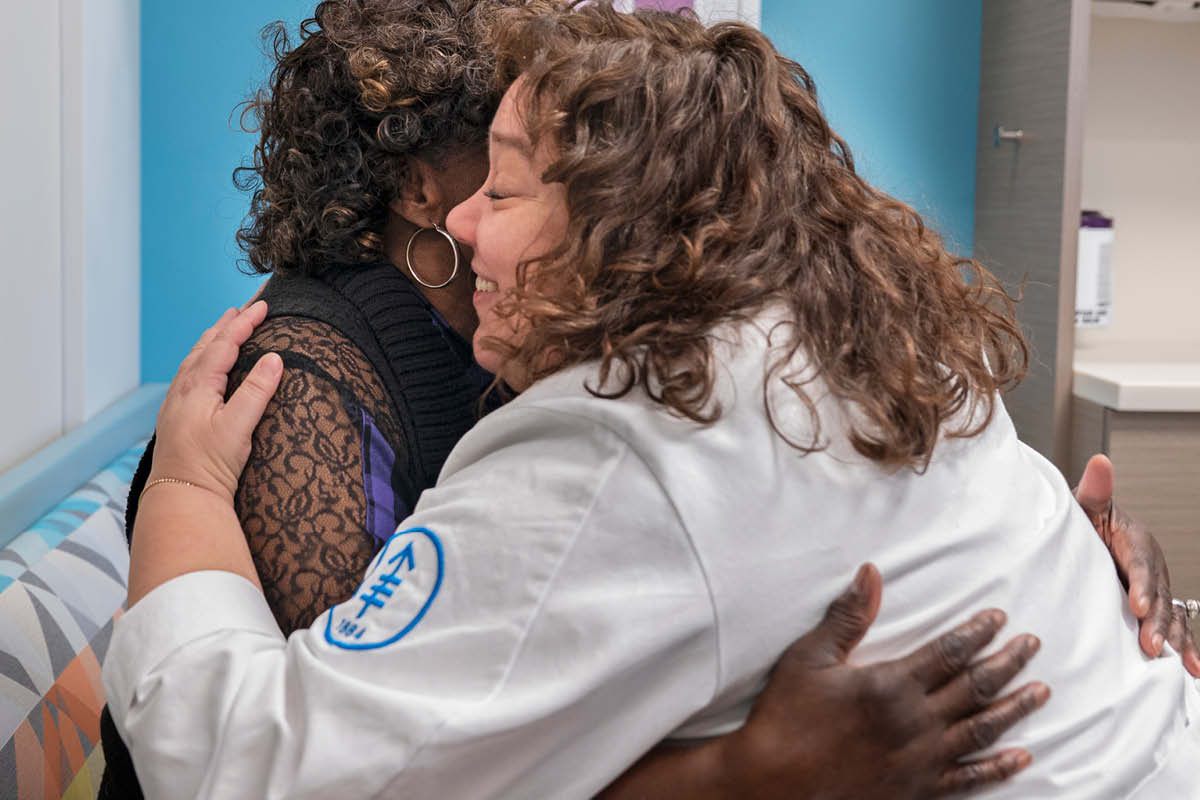
Ingrid Adams has had her non-small cell lung cancer remain stable for more than six years, thanks to a clinical trial at MSK.
Ingrid Adams, now 68, has been coping with metastatic lung cancer for more than a decade. Standard treatment — including chemotherapy and radiation therapy — kept her disease under control for a while, but the cancer continued to spread. Everything changed when she came to Memorial Sloan Kettering Cancer Center (MSK) in 2017 and was given the opportunity to participate in a phase 1 clinical trial (research study) for a targeted therapy called repotrectinib (Augtyro™).
Six years later, the cancer has shrunk substantially, and her disease has remained stable ever since.
The drug Ingrid was given was approved in November 2023 by the Food and Drug Administration (FDA) to treat advanced non-small cell lung cancer with a ROS1 fusion. The approval was based on findings from the trial in which Ingrid was one of the very first patients.
The study, called TRIDENT-1, was a phase 1/2 trial that enrolled 127 patients around the world. The results are being published in The New England Journal of Medicine on January 11, 2024. The first author of the paper was Ingrid’s doctor, MSK thoracic oncologist and early drug development specialist Alexander Drilon, MD.
Investigators reported encouraging results:
-
Among patients not previously treated with a ROS1 inhibitor,
- Nearly 80% responded to the drug, meaning that their tumors got smaller or stopped growing.
- Repotrectinib held lung cancer tumors at bay for an average of nearly three years.
-
Among patients who had already received other therapies, including a ROS1 inhibitor,
- Nearly 40% responded, meaning that their tumors got smaller or stopped growing.
- Repotrectinib appears to shrink tumors not only in the lungs but also those that spread to other locations, including the brain, a common site for lung cancer metastases.
- Although repotrectinib does have side effects, only 7% of patients had to stop taking the drug because of them.
“This drug is a win on many fronts,” says Dr. Drilon, who is Chief of the Early Drug Development (EDD) Service at MSK. “Repotrectinib not only has a good chance of working well but it can work for a very long time, possibly longer than other approved treatments.” He explains that MSK was involved in the development of repotrectinib from the very early stages, including some of the studies that showed how the drug works in the brain as well as the body, and how it works in tumors that are resistant to other drugs.
MSK has now treated close to 50 patients with repotrectinib across all clinical trials. As one of the first people enrolled in the study, Ingrid has now been on the drug longer than any other patient — for more than six years.
What Are ROS1 Fusions in Cancer and How Does Repotrectinib Target Them?
Repotrectinib works by targeting an error in cells called a ROS1 fusion. The ROS1 defect occurs when a piece of one gene breaks off and attaches to another unrelated gene. In turn, the defect causes cells to grow out of control and form tumors. ROS1 fusions are found in between 1% and 2% of lung cancers. They are detected with tumor sequencing tests like MSK-IMPACT®. They also occur in other cancers, including glioblastoma, a type of brain cancer, and cholangiocarcinoma, also known as bile duct cancer.
Research on the drug is ongoing and includes trials for both adults and children with other types of cancer caused by ROS1 fusions. It is also being studied in cancers caused by NTRK fusions, another of the drug’s targets.
People With Lung Cancer Can Respond Well to Repotrectinib, but Unique Side Effects Should Be Monitored
Repotrectinib is not the first drug to target ROS1 fusions. The FDA previously approved two other drugs, crizotinib (Xalkori®) and entrectinib (Rozlytrek®). But crizotinib and entrectinib may work for a shorter time than repotrectinib before the tumors evolve and begin to develop resistance. Furthermore, many patients whose cancers develop resistance to crizotinib or entrectinib can still respond to repotrectinib. Before getting repotrectinib, Ingrid had received crizotinib, but it stopped working after only seven months.

Clinical trials nurse Kaitlin Balbo (left) and nurse practitioner Virginia Ferreira (right) take care of patients enrolled in clinical trials at MSK, including Ingrid.
“Advances in the treatment of lung cancer have really exploded in the past few years,” says Kaitlin Balbo, MSN, RN, a clinical trials nurse who is part of the EDD team. “In addition to repotrectinib, we are also able to offer other new therapies to many people with lung cancer. These options, including a newer ROS1 inhibitor that may work after repotrectinib, were not available at the time Ingrid was first diagnosed.”
Most patients tolerate repotrectinib well, but dizziness is a common side effect, and patients who are sensitive to it may need a lower dose. About one in three patients on the clinical trial had to take a lower dose because of dizziness or other symptoms.
Other side effects are a metallic taste in the mouth, a burning sensation in the limbs, and weight gain over time. Serious side effects are less common and include muscle breakdown and liver or lung inflammation. Only 7% of patients had to stop taking the medicine because of side effects. Ingrid says she had tingling in her hands and fingers when she first started taking the drug, but not so much anymore since her dose was cut from four to two pills. She continues to take the pills every day.
Grateful for a Clinical Trial and Compassionate Care
The idea of taking an experimental drug didn’t make Ingrid nervous. “I was just grateful my doctors found something that could help me,” she remembers.
Ingrid says she’s bonded with several members of her team involved in the trial, especially nurse practitioner Virginia Ferreira, DNP.
“Because we see patients in clinical trials so frequently, we develop strong relationships with them,” Dr. Ferreira says. “Having significant trust in us is important because, in some cases, we are asking people to take drugs that have never been given to humans before.”

Ingrid and Dr. Ferreira have developed a close relationship during the six years Ingrid has been receiving care at MSK.
Ingrid appreciated how her team went above and beyond to take care of her. She had been having problems with a swollen knee for a long time, due to years working as a home health aide. After ordering scans to confirm the problem was not related to her cancer, Dr. Ferreira helped arrange for Ingrid to see an orthopedic specialist. It turned out to be a torn meniscus, which was surgically repaired in April 2023 at a local hospital near Ingrid’s home.
“At MSK, we always focus on the whole patient,” Dr. Ferreira says. “We feel fortunate to see patients’ health improve to the point that many of them — even those who are very sick when they first come to see us — are able to go back to living full lives.”